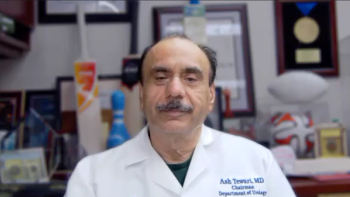
Cancer Stem Cells Underlie Testicular Cancer’s Vulnerability to Genotoxic Chemotherapy
Researchers have discovered that testicular cancer’s responsiveness to conventional chemotherapy is likely determined during prenatal development.
Testicular germ cell tumor (TGCT) risk is likely determined during prenatal development and TGCT cancer stem cells (CTCs) are unusually sensitive to conventional chemotherapy, potentially explaining why even after metastasis, testicular cancer is unusually responsive to chemotherapy, according to findings from a mouse study
Researchers at Cornell University in New York and Duke University Medical Center in Durham, North Carolina engineered a mouse model that emulates human testicular tumor biology and growth rate.
Human TGCT is usually diagnosed in early adulthood, between age 18 and 40 years, in contrast to many other cancer types that are more frequently diagnosed in late adulthood. Epidemiologic research has suggested that human TGCT risk is related to prenatal exposures, the authors noted.
They developed a mouse model with germ cell–specific KRAS activation and PTEN inactivation. The engineered mice developed metastatic teratoma and embryonal carcinoma TGCTs; the embryonal carcinomas were stem cell–like, and expressed the pluripotency factor OCT4. In the mice, embryonic germ cells were susceptible to malignant transformation but the same KRAS- and PTEN-associated oncogenic aberrations triggered apoptotic cell “suicide” in adult germ cells, consistent with in utero events contributing to TGCT risk, the researchers found.
Lower numbers of embryonal carcinoma in TGCTs after treatment correlated with impaired tumor growth when tumor cells were transplanted to untreated mice.
The researchers also reported a potential insight into why human testicular cancers are amenable to chemotherapy. In most human cancer types, tumor cells are vulnerable to conventional chemotherapies but CTCs are more resistant and survive to seed the microscopic secondary tumors that cause relapse. But in the mouse model of TGCT, the researchers found that CTCs are more sensitive to conventional anticancer treatments than TGCT tumor cells, noted senior author Robert Weiss, professor of biomedical sciences at Cornell. When the mice were treated with genotoxic cisplatin chemotherapy, OCT4+ CTCs were eliminated, tumor size declined, and survival was prolonged.
“Since a single intact EC [embryonal carcinoma] cell is sufficient to induce tumorigenesis, these results support the notion that the chemosensitivity of TGCT CSCs underlies the remarkable curability of TGCTs,” Dr. Weiss and his coauthors reported in the paper. “Consistent with this conclusion, OCT4+ EC cells were detected in 4 of 5 tumors arising from transplants derived from untreated mice but in none of the 4 tumors formed by cells from cisplatin-treated animals.”
They also reported that in postnatal germ cells, the engineered alteration in KRAS and PTEN function to emulated human TGCT “initially triggered widespread over-proliferation, but ultimately led to cell death and germ cell depletion.”
“Together, our results suggest that there is a specific developmental window during which TGCTs can arise,” they reported.
Understanding what leaves testicular cancer cells more vulnerable to chemotherapy might help researchers understand how to better manage other, more aggressive cancer types, the authors noted.
The study was funded by New York Stem Cell Science and the U.S. National Cancer Institute’s Provocative Questions Initiative.
Newsletter
Stay up to date on recent advances in the multidisciplinary approach to cancer.






































